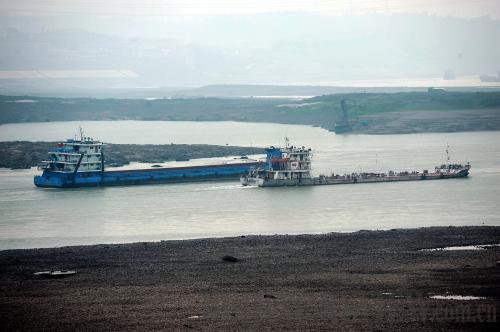|
 |
|
SHIPPING PROBLEMS: A ship navigates a section of the Yangtze River near Chongqing. The decreasing water level in this section of the river poses a major threat to ships in the region (ZHOU HENGYI) |
Yang Guiming, chief forecaster at the National Meteorological Center, attributed all extreme weather to global warming.
Statistics from the meteorological departments showed the average temperature in Yunnan this winter reached record highs since 1950.
"The polar glacier defreeze, caused by warming weather, leads to a rise in sea level, which will then swallow up large pieces of land," Yang said.
Global warming will also change the planet's climate zones. For instance, forests will move closer to the polar regions; middle latitude weather will become dry as deserts and grasslands expand; and contagious diseases will spread at a faster speed, Yang said.
The pursuit of economic benefits has also taken a toll. Some southwestern provinces have made a habit of cutting down primitive forests to grow water-consuming rubber trees and mallee, leading to rapid decreases in underground water levels and poor water-soil conservation.
But as huge tracts of fields dry out, authorities have come to fear another hazard: sinking land. Yunnan local media outlets reported the ground base of Kunming Wujiaba International Airport sank and cracked due to a lack of precipitation.
An inadequate irrigation network also plagues the region. Local farmers rely heavily on rainfall to irrigate their crops and are often reluctant to tap into the huge pool of water sources scattered throughout the province. Experts agree governments at all levels are duty-bound to provide sufficient irrigation system for farmers.
Long-term solution
The prevalence of extreme weather conditions underlines the importance of relieving agricultural disasters and tackling climate change. The McKinsey report estimated China would need to spend up to 25 billion yuan ($3.66 billion) each year between 2010 and 2030 to counter the effects of drought and avert substantial agricultural losses.
The Chinese Government has all but maxed out its efforts to secure a daily supply of water to drought-ridden areas, but climate experts reminded officials the expedient action would not serve as an ultimate solution to the natural disaster. Instead, more substantial efforts must be directed by the government, companies and individuals in combating global climate change.
To combat current and future agricultural disasters, Yan Denghua, an expert at the China Institute of Water Resources and Hydropower Research, suggested shutting down factories with water consuming inefficiencies. In the meantime, local companies should make full use of reclaimed or recycled water, while natural water should be reserved for human, plant and animal needs.
Zheng suggested setting up agricultural disaster relief administration at all levels of government since existing departments are not proficient in managing agriculture-related disasters. The new administration would work closely with meteorological, irrigation, geological and civil affairs departments to form a coordinated system, and strengthen monitoring and early warning methods.
The government and agricultural companies should promote practical disaster relief technologies among farmers and invent special facilities and equipment to fight agricultural disasters, Zheng said.
Farmers should grow crops and plants according to soil and weather conditions. To some extent, part of the crop failure was due to blind planting as farmers chose more profitable plants regardless of natural conditions.
Against the backdrop of global warming, the government as well as companies should foster drought-enduring and heat-resisting seeds, a development Zheng expects would be a trend in areas frequently affected by droughts.
To prepare for major disasters, agricultural departments should set up a storage system for seeds, herbage, fertilizer, pesticide, kerosene and pumps. Zheng also suggested storing crop seeds that can grow healthily on dry land.
Zheng highlighted the need to provide agricultural insurance to protect farmers from the inevitable loss of crops and livestock from droughts or other natural disasters. Trial insurance would be offered in major commercial crop production bases and then expanded to the rest of the country.
Xu said in a report assessing climate change in Yunnan that it is less likely for the province to have another major drought similar in scale to the current disaster in the near future. The drought, Xu said, is a periodical incident occurring every 30-50 years. But the province and the southwestern region at large cannot be negligent of the fact the extreme weather probability has not been reduced.
Xu, warning Yunnan might suffer serious flooding in the years to come, worried the current anti-flood facilities and procedures—like those meant to address droughts—are far from enough. | 